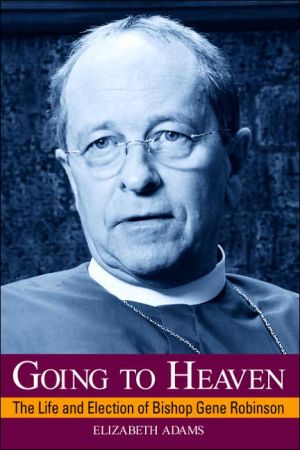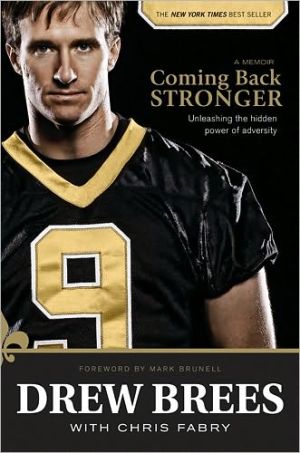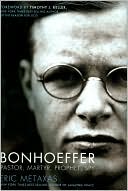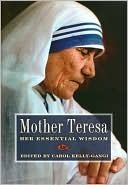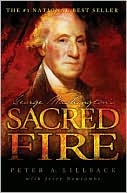Going to Heaven: The Life and Election of Bishop Gene Robinson
"Gene Robinson is the first openly gay bishop in Christendom and his election has set off a worldwide firestorm of reaction. Robinson wore a bulletproof vest to his consecration and has been subjected to death threats for the past several years. However, Robinson's election has also elicited an outpouring of goodwill - everyone from Ellen DeGeneres and Matthew Shepard's mother to Archbishop Desmond Tutu has spoken in support of him - and his efforts to articulate a vision of inclusion,...
Search in google:
A sharecropper’s son, Gene Robinson rose to become an Episcopal priest and later, the first openly gay bishop in the Anglican Church. His election set off a worldwide firestorm of reaction, both positive and negative. Based on extensive interviews with Bishop Robinson and the people around him, Going to Heaven paints a portrait of the man who is, as he puts it, “neither the angel nor the devil some would make me out to be.” The book illuminates his early life; his struggle with his sexual orientation; his calling into the church; and finally, the tumultuous events surrounding his election and consecration. Gene Robinson’s life is a compelling story of challenges overcome by hard work, humor, and deep faith, but it is also a story of one man’s journey into his own “otherness” and the emergence of a ministry that speaks to countless people who believe in a Gospel of love and inclusion.
Going to Heaven\ The Life and Election of Bishop Gene Robinson \ \ By Elizabeth Adams \ Soft Skull Press\ Copyright © 2006 Elizabeth Adams\ All right reserved.\ ISBN: 1-933368-22-5 \ \ \ Chapter One\ A Kentucky Childhood \ "You now have my undivided attention," said the bishop-elect, his bright eyes sparkling behind round wire-rimmed glasses as he shut the heavy, old oak doors of the conference room behind him. Gene Robinson, wearing a black shirt, clerical collar and a cross, shook hands and sat down at the big table in the former formal dining room of an old New England house that is now the headquarters of the Diocese of New Hampshire. "I'm so excited about this!" he said, clapping his hands together and grinning like a kid about to jump on a hayride. "Where shall we start?"\ Gene laughs a lot: a delighted laugh that emerges from him as naturally as his concern when he hears of a problem. He is an extrovert who thrives on being with people, whether they are old friends and close colleagues or individuals he's never met. As he confers with his staff, hearing about upcoming phone calls and appointments, he is joking one minute, serious the next. But in the early days following his election, amid increasing pressure and publicity, everyone close to him wondered whether he'd be able to keep the warmth, humility, and personal touch that had endeared him to thediocese. Would he be able to juggle the job he'd been elected to do with his new role as an icon for gay rights and all that came with it: the speaking engagements, the awards, the glamour of celebrity, the travel schedule? Would fame go to his head? Or worse, would he crumble under the spotlight and the strain of scrutiny? How would he handle the effect on his family? Could one man really bear the vilification, the physicals threats, and the personal exposure of being at the center not only of the debate over homosexuality, but of a schism that could split the Episcopal Church and the Anglican Communion at large?\ What lay ahead?\ At that early date, no one knew. There was a clue, however, in those first words he spoke. We did have his undivided attention, and that attention never faltered. A priest who knows him well put it this way, "When you're with Gene, you feel like you're the most important person in the world. And even though you know that he's going to make the next person feel exactly the same way, it's fine-because you also know it's absolutely sincere."\ Only a person who is extremely calm and secure about himself can step aside and listen to others in that way. At the time of his election, Gene had no idea of the storm that was gathering, the toll it would take, or the story that it would eventually write. He had no idea what would be said about him, about gay people and God, or what his election would mean-either to those who vehemently disagreed, or to those for whom it was a gateway to life-changing acceptance and affirmation. What he did have was the sure, calm center he needed not only to survive, but to grow, to help, and to lead. That center had begun to develop long before, in a very different world.\ Gene Robinson grew up in Fayette County, which surrounds Lexington, Kentucky. He was not born into a world of privilege and affluence-his parents were poor tenant farmers who worked in the tobacco fields all day long. Their house didn't have running water until Gene was ten years old. "It's kind of amazing even for me to look back on," he said, "but it was pretty basic: if you wanted cold water you cranked it out of a cistern, if you wanted hot water you put it on the stove and heated it up."\ The life Gene entered, on May 29, 1947, was hard enough in itself, but he had barely survived an extremely difficult birth which had left him temporarily paralyzed and his head misshapen. The pediatrician, certain that the baby wouldn't survive, massaged Gene's head into a more normal shape so that his young mother-only twenty years old at the time-wouldn't be horrified when she saw her child in his coffin. The Robinsons had hoped for a girl, and when the hospital asked them to indicate a name for the birth and-as they thought likely-death certificates, they named the baby Vicki Gene Robinson, after his father, Victor, and his mother, Imogene.\ When the baby did survive, he was given to his parents to take home-"to watch me die or become a vegetable," said Gene. "My dad was poor and uneducated. I can't imagine what this would have felt like to him at age twenty or twenty-one, except I suspect it was awful."\ The young parents didn't know what to expect, except that the doctors had told them the baby would probably die soon. When he didn't die, they were told he would stop developing, that he would never walk, talk, or have any use of himself. Many years later, Gene's father told him, "I couldn't take any joy in you and your development because I always thought each step was going to be the last thing. So you rolled over; that was as far as you were ever going to go. Okay, so you sat up; that was as far as you were ever going to go." He said he was never able to rejoice because he was too focused on, "Well, that's the last thing."\ But the baby grew into a boy who could not only walk and talk but was curious and eager. He was under the care of a pediatrician who became an important influence on Gene's young life. "He took care of me until I was way too old to be going to a pediatrician," Gene said, "and I idolized him to the point where I was convinced that that was what I wanted to be myself."\ Somehow, Gene feels, his father's early fears for his son became translated into excessive strictness. "I don't ever remember being beaten, but I do remember the terror that he could put in my heart by just touching his belt buckle. If we were out in public somewhere, and I was doing something that he didn't want me doing, he would just touch his belt buckle, and I would just freeze. So probably deep in my subconscious somewhere are memories that have not surfaced. I don't have any memories of being beaten, but I can't imagine why I'd be that terrified if something hadn't preceded it."\ As the son of tobacco sharecroppers, Gene knew what it was like to be poor. He also had, from childhood, a heightened sensitivity to "otherness": in segregated Kentucky in the forties, fifties, and sixties, otherness was everywhere.\ "I remember a hot summer day in Lexington, Kentucky," he said. "My mother had taken me swimming. We were at a public swimming pool, and my mother saw a black family get in the pool, at the other end, and I remember, like it was yesterday, being taken out of that pool and driven all the way across Lexington to a segregated swimming pool." He shook his head in disbelief. "That segregated pool was in an amusement park which was called 'Joyland.'"\ "When we'd go to the movies, the ticket office was on a corner. And the woman selling tickets sat on a chair that rotated. And she'd turn around to the window that sold tickets for whites, and then turn around to the ticket-window on the other side of that corner, on the side street, to sell tickets to blacks. And then they went upstairs and sat in the balcony, and we sat downstairs." It was one thing, and bad enough, that blacks were forced to take the worst theater seats and sit in the backs of buses. But racism goes to another level when "contamination" is implied: pool water can't be shared; drinking fountains must be separate. It's a short step from there to the presumption of guilt: Gene remembered a Saturday afternoon in Nicholasville, Kentucky, when a jury was in the courthouse making a decision about a black man who had allegedly accosted a white woman. "I can remember the smell of lynching in the air," he recalled with a shudder.\ Gene sometimes calls himself "a recovering racist"; he feels it's impossible to grow up white in America and not be racist at all, because racism has such a strong background in the culture. He remembers members of his own family calling Martin Luther King, Jr. a communist. But his grandfather, whom he calls his "most beloved grandparent," was different. For a time, he served as a policeman in that same town of Nicholasville, Kentucky. "I don't think he ever arrested anyone, he just couldn't bring himself to do it," Gene said. "I can remember him saying, shaking his finger at me, 'Don't ever let me catch you saying the word "nigger."' And I remember, at his funeral, all the black people who showed up to honor him."\ Because of Gene's very difficult birth, his mother was advised not to get pregnant again, but ten years later she did, and gave birth, without complications, to his sister Karen. Because the two siblings were so far apart in age, they didn't play together much or become close friends until later in life.\ The hard life of the tobacco fields, combined with poverty, didn't leave a lot of time for other activities beyond keeping the family going. What the Robinsons did have was a tightly-knit community centered on religion. Gene's parents were, and still are, members of a small Disciples of Christ congregation. He describes his upbringing as "very religious."\ "The church was probably the only community anybody had outside of blood kin," he remembered. "The blood kin thing was really strong, and, because families have fights and stuff, church was nearly as strong, if not in some ways stronger. Church is still what my parents do."\ "The thing that I loved and respected about it was that it was so second nature and unselfconscious. If someone in that community-I'm talking about maybe sixty or seventy people-if somebody's sick, somebody's in the hospital, somebody has a relative that dies, nobody has to think about, 'Do we go see them?' Well, of course, you go see them! You might wonder whether you should take the vanilla wafer pudding, banana pudding, or a chess pie, but that would be about the only decision. It would not be about should you go see them? Should you offer to help? Should you offer to get their tobacco stripped while they're doing the funeral, or all that kind of stuff."\ "It strikes me, in most of the churches that I've been in, you really have to push people to go and do and be the hands and feet of the Lord. And that is just not the case back where I came from. My parents are the most amazing Christians I've ever known. Now, they don't do a lot of talking about Jesus, actually, except at Sunday School. They didn't talk all about that, but in every moment of their lives, they're just doing it. It's really astounding."\ Gene himself entered church life willingly. The Sunday services were very long, starting with hymns and prayers, and then moving to an hour of Christian education for everyone-children and adults. That was followed by another hour of worship. There was youth group every Sunday night. Gene had thirteen years of perfect attendance at Sunday School and is still amused when he recalls the formidable woman who ran the Sunday School and allowed no excuses, even for sickness. "I think you could have gotten hit by a car and it wouldn't have mattered," he said, laughing. "I remember going once and then telling my mother that I thought I had measles right after. I probably gave the entire class measles because I was just not going to miss," he said, shaking his head ruefully. "So that thirteen years of perfect attendance pins really means that I did not miss a single Sunday."\ The sharecroppers worked in the fields all day and then went to revivals at night in the summertime. These tent meetings took place during August, the hottest month of the year, when the farmers were bringing in the tobacco. Gene describes tobacco harvesting as "ungodly work" in Kentucky's heat and humidity, and speculated that maybe it helped people identify with the fire-and-brimstone preaching by the itinerant preachers who led the revivals. "Everyone would sit there fanning themselves with one of those funeral home fans with a picture on it of Jesus knocking on the door of your heart," he said. At the age of twelve, during one of those revivals, Gene took Jesus Christ as his Lord and Savior and was baptized.\ The Disciples of Christ denomination is not well known in the Northeast, but it is actually a substantial Christian denomination in North America, with over 800,000 members in the United States and Canada. It was founded as part of the "great awakenings," the series of religious revivals that swept through the formerly Puritan eastern states in the late eighteenth and early nineteenth centuries. The revival movement was characterized by flamboyant and highly emotional preaching that led to widespread conversions, and it planted the roots for what we call evangelicalism today.\ At the time, Kentucky and Ohio were the "Western Frontier." The denomination's origins go back to a Presbyterian minister, Barton W. Stone, who was born in Port Tobacco, Maryland in 1772. Stone served as minister in Cane Ridge, Kentucky, where he hosted a famous revival in 1801. Along with several others, he formed a group that dissolved its ties to all denominations, rejected all creeds, and took the Bible as its sole authority. They called themselves simply "The Christians," believing that the body of Christ was and should be united as one.\ Thomas Campbell and his son Alexander were both born in Ireland and came to America from Scotland-Thomas in 1807, and his son two years later. In Pennsylvania, they, too, refused to use the Presbyterian creeds, taking the motto, "Where the Scriptures speak, we speak; where the Scriptures are silent, we are silent." Their movement, which was allied for a time with the Baptists, became known as the Restoration Movement. In 1830, the Campbells and their followers became independent of the Baptists and took the simple name of "Disciples." The younger Campbell was influenced by, and in great agreement with, the principles of Thomas Jefferson. He wrote a great deal and was an excellent public speaker who engaged in a marathon eight-day debate on Catholicism with the Roman Catholic archbishop of Cincinnati, John Purcell.\ In 1832, in Lexington, Kentucky, Stone's "Christians" and the Campbells' "Disciples" united to form the Disciples of Christ.\ Gene Robinson explained that the denomination was founded in reaction to churches like the Episcopal Church, in which there was thought to be too much emphasis on ritual. "What they were trying to do was recover the early, New Testament church," he said. "So the only creedal statement required was, 'Do you take Jesus Christ as your Lord and Savior?' It was real simple. And baptism was by full immersion."\ The church his parents belonged to was one of the earliest congregations, and a direct ancestor of theirs had been one of the founding members. There has been one son in each generation of Robinsons, and that son has always become an elder of the church.\ Today Gene describes the Disciples of Christ as "a pretty great denomination," saying he didn't have much perspective on what it was as a national denomination until he learned more about it after leaving home. "The particular congregation my parents belonged to was more narrow and more tending towards fundamentalist than the denomination as a whole," he said. "I think that probably had to do with the level of education of the people in the congregation, more than anything. These were virtually all poor tobacco farmers, not all of whom-including my father-had finished high school." The ministers in that church were seminarians at the local seminary, whose name at that time was College of the Bible; it's now the Lexington Theological Seminary.\ For a church that was supposedly non-liturgical, there was strict adherence to an order of worship. "You ought to try changing the order of any one of those things that took place," Gene recalled, with a laugh. "There would be hell to pay! But those liturgies weren't written down in books anywhere; they were just written down in people's hearts and memories." Another aspect that he finds fascinating (and that is quite different from many reformist Protestant denominations) is that there was Communion every single Sunday. The Communion was presided over by lay deacons and elders, not the minister. "Now they would certainly not espouse any kind of belief in the Real Presence of Jesus in the communion," he added emphatically. "This is just a memorial meal."\ (Continues...)\ \ \ \ \ Excerpted from Going to Heaven by Elizabeth Adams Copyright © 2006 by Elizabeth Adams. Excerpted by permission.\ All rights reserved. No part of this excerpt may be reproduced or reprinted without permission in writing from the publisher.\ Excerpts are provided by Dial-A-Book Inc. solely for the personal use of visitors to this web site. \ \
1A Kentucky childhood92The making of a priest233Sisterhood334Moving toward wholeness455Preparation and call596The New Hampshire election837A swift and sharp reaction1018The opposition1139General convention12910Centering14911Consecration18112Consecration18113Becoming a bishop20714Reverberations23115In the public eye25116Accepting the mantle267
